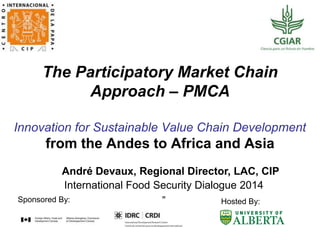PMCA Innovation Approach Stimulates Sustainable Value Chain Development
The Participatory Market Chain Approach (PMCA) stimulates innovation among actors along agricultural value chains. It builds trust between farmers, intermediaries, processors, retailers, consumers, and research organizations. Over multiple phases, PMCA uses participatory analysis and group work to identify market opportunities and develop new products, technologies, and institutions. It has helped transform native potatoes from a staple crop into value-added products in Andean markets. Lessons show PMCA is most effective when combined with other programs and evolves over time, sparking second and third generation innovations. It has also been adapted successfully in other regions through approaches like Farmer Business Schools in Indonesia.

Recommandé
Recommandé
Contenu connexe
Tendances
Tendances (20)
En vedette
En vedette (13)
Similaire à PMCA Innovation Approach Stimulates Sustainable Value Chain Development
Similaire à PMCA Innovation Approach Stimulates Sustainable Value Chain Development (20)
Plus de IFSD14
Plus de IFSD14 (20)
Dernier
Dernier (20)
PMCA Innovation Approach Stimulates Sustainable Value Chain Development
- 1. The Participatory Market Chain Approach – PMCA Innovation for Sustainable Value Chain Development from the Andes to Africa and Asia International Food Security Dialogue 2014 ”Sponsored By: Hosted By: André Devaux, Regional Director, LAC, CIP
- 2. Native potatoes, an opportunity for Andean farmers …but undervalued in modern society • Seen as staple, “rural” food • Few native varieties in urban markets • How to transform opportunity in competitive advantage for Andean farmers?
- 3. Outline Introduction Characteristics of PMCA and its development Experiences of implementation and its evolution from the Andes to Africa and Asia Some lessons learned
- 4. Stimulating innovation along value chain Innovation Process Producer Intermediary Wholesaler Processor Retailer Consumer Commercial Innovations Institutional Innovations Technological Innovations Research outputs: Creative ideas, methodologies Dynamic Markets New products, added value, Andean farmer’s asset: Potato biodiversity Interaction with different stakeholders Capacity to innovate Partnership, new working relations
- 5. Participants R&D Orgs. Interest Trust Collaboration 1yearapprox. Diagnosis: Specific market chain Understand market chain actors activities, interests, ideas, problems Participatory analysis new market opportunities: Work in thematic groups Objective per Phase Phase 1 Phase 2 Phase 3 Develop market driven innovations: •new products •new technologies •new institutions Public Event 1 Public Event 2 Final Public Event Leadership Facilitation Backstopping Consolidation of created innovations A systematic R&D process that: •Builds trust among market chain actors and with R&D organizations •Stimulates market driven innovation of different types PMCA
- 6. PMCA User & trainer guides
- 7. PMCA in summary • Characteristics: • Helps the different actors of the market chain, including farmers, to express better their needs to R&D organizations • Stimulates innovations of different types among market chain actors through collective learning and trust building • Facilitates partnership among farmers, market chain actors and service providers for improving the VC efficiency. • PMCA needs good facilitation, a champion • Knowledge of local social culture, political sense • Good networking, specially with the private sector
- 8. 5/13/2014 PMCA development: time line and partners
- 9. PMCA Peru
- 10. Implementaion in Uganda and Indonesia
- 11. 11 Fase 3Uganda ” Regreso
- 13. Experiences from the Andes, expanding and learning from other regions.
- 15. 2002 2006 Growth of the native potato chip market 2008 MT 1000 2000 Challenge Creative imitations Large companies Challenge => CSR + Technologies 2004 Industry • Quality Volumes Regularity Formality • Asimetric bargaining power Commercial innovation 2009
- 16. RESEARCH DEMANDS : TECHNOLOGICAL INNOVATION NEW FORMS OF ORGANIZATION : INSTITUTIONAL INNOVATION NEW MARKET OPPORTUNITIES : COMMERCIAL INNOVATION PMCA PMCA as a trigger to stimulate innovations POLICY INCIDENCE AND ADVOCACY: NEW NORMS, NATIONAL POTATO DAY
- 17. FARMER BUSINESS SCHOOL Market Chain-Wide Learning Approaches Farmer Field School Participants are farmers Learning cycle covers cropping season Learning content focuses on crop prodn Participants are actors in market chain Learning cycle covers prodn-marketing Learning content focuses on marketing Participants are farmers; includes interactive events with other chain actors Learning process based on FFS principles of experiential learning Learning cycle covers prodn-marketing Learning content is based on market chain framework Indonesia: Farmer Business School (FBS) FBS Combines the Best of FFS and Market-Chain Approaches
- 18. Lessons learned The PMCA as a new way to do agricultural R&D with a strong innovation focus • Contributed to change work and relationship between the heterogeneous market chain actors (institutional innovations), – Key to have a champion to facilitate the process • Triggers innovation process, evolves over time, second and third generation innovations emerge after PMCA has ended • PMCA is most effective when applied together with other measures as part of a broader intervention (program or project) – Innovation platforms, farmers’ organizations, public awareness,… • PMCA developed in the Andes was enriched from global applications in other regions through South-South learning : – Farmer Business School in Indonesia and Asia – Gender tools in Uganda and East Africa
- 20. Andean farmers’ asset: native potato biodiversity Appealing for high value, niche markets Comparative vs. competitive advantage Colorful, nutritious, healthy, natural, cultural identity
Notes de l'éditeur
- The PMCA triggers innovation processes, which often evolve long after the PMCA has ended. 2. (farmer’s organization, innovation platforms, business development, public awareness, policy)